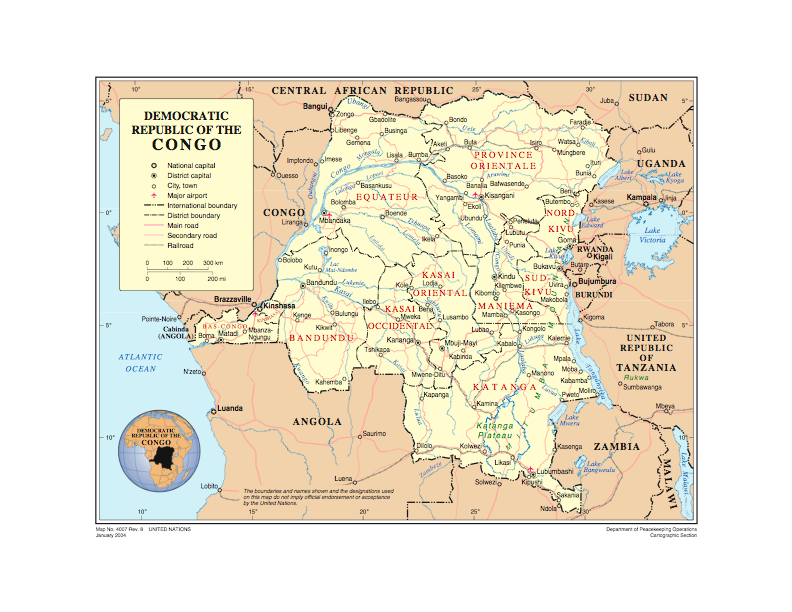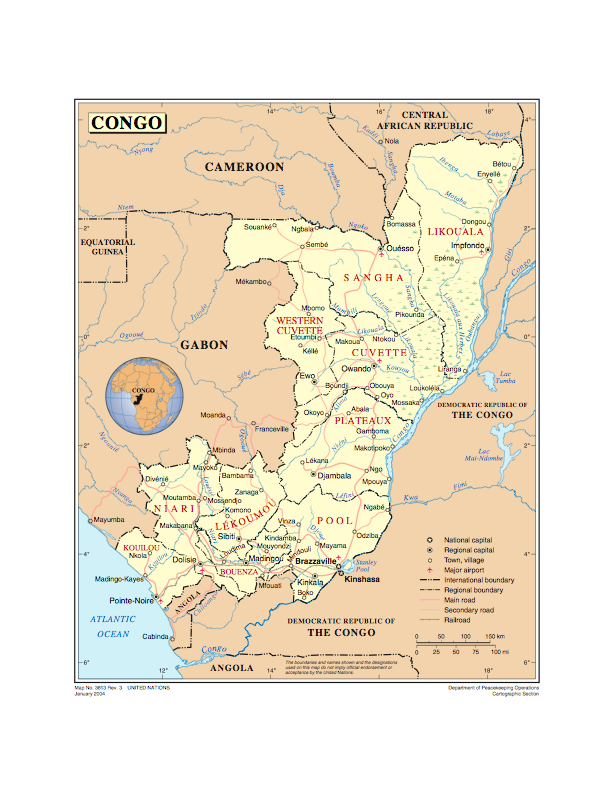
- •Preface
- •Acknowledgements
- •Chapter 1
- •Introduction
- •Chapter 2 Approaches
- •Identity and Identification
- •Chapter 3 "Ah, Mokili!" -- a Brief History44
- •Chapter 4 Urban Inventions -- a New Old Sound Emerges
- •Instrumentation
- •Chapter 5
- •Chapter 6 Conclusions and Further Questions
- •Bibliography
- •Discography
Made in Congo
Rumba Lingala and the Revolution in Nationhood
by
Jesse Samba Samuel Wheeler
A thesis submitted in partial fulfillment of the requirements for the degree of
Master of Music
(Ethnomusicology)
at the
University of Wisconsin-Madison
1999
To Lillian Estelle Fishman Chasnoff and Jack Aaron Chasnoff
To my family and my friends, who help me compose my everyday life
Contents
List of Maps, Chart, Figures and Excerpts v
List of Audio Examples vi
Preface vii
Acknowledgments viii
Maps x-xi
1 Introduction 1
Review of Literature 9
2 Approaches 19
3 "Ah, Mokili!"-- a brief history 32
Life in the Cities 39
4 Urban Inventions -- a new old sound emerges 44
Maringa 49
Rumba Lingala 52
5 "Made in Congo" -- conceiving the nation 86
Performance Sites and Performance Rites 87
Technology 101
Language 117
6 Conclusions and Further Questions 132
Bibliography 142
Discography 151
Maps, Chart, Figures and Excerpts
Map 1: Democratic Republic of the Congo x
Map 2: Republic of the Congo xi
Chart 1: Growth of Major Congolese Cities 38
Figure 1: Maringa Rhythms 50
Figure 2: Clavé Beat in Rumba Lingala 59
Figure 3: Typical African Timeline 59
Figure 4: Cuban Clavé Beat 59
Figure 5: Fast Clavé Beat in Rumba Lingala 59
Figure 6: Variation on the Clavé Beat in Rumba Lingala 59
Figure 7: Medium Clavé Beat in Rumba Lingala 59
Figure 8: Bass Guitar Motif 60
Figure 9: Maracas Rhythm 60
Figure 10: Drum Rhythms 60
Excerpt 1: "Noko Akomi Mobali" 76
Excerpt 2: "Margarine Fina" 78
Excerpt 3: "Marie-Louise" 80
Figure 11: "Émissions Africaines" of RCBI 109
Figure 12: Indoubil Examples 125
Excerpt 4: "Cha Cha Cha Bay" 126
Excerpt 5: "They say that the town [sic]" 137
Audio Examples
A1: "Tout le monde samedi soir" -- Adou Elenga
A2: "El Manisero" -- Abelardo Barroso & La Orquesta Sensacion
A3: "Mazole Vanga Sanga" -- Bokolanga
A4: "Maria Antonia" -- Pholidor & Bana Loningisa
A5: "Indépendance Cha-Cha" -- Kabasele & African Jazz
A6: "Ménagère" -- Lisanga Pauline
A7: "On entre O.K., On sort K.O." -- Franco & O.K. Jazz
A8: "Noko Akomi Mobali" -- Adikwa
A9: "Prince Baudouin" -- Lufungola Alphonse
A10: "Na Mokili Moko Te" -- Kalima Pierre & His Fanfare
B1: "Njila ya Ndolo" -- Antoine Mundanda & Ses Likembes Geantes
B2: "Nalekaki na Nzela" -- Dewayon
B3: "La Rumba O.K." -- Franco & Bana Loningisa
B4: "Margarine Fina" -- Tino Mab
B5: "Marie-Louise" (1948) -- Wendo
B6: "Marie-Loiuse" (1958) -- Wendo & Beguen Band
B7: "Afrika Mokili Mobimba" -- Dechaud & African Jazz
B8: "Cha Cha Cha Bay" -- Camille Feruzi & L'Orchestre Mysterieux Jazz
B9: "Banzanza" -- Roitelet & Bana Loningisa
Preface
This thesis is the result of almost four years of research, the self-motivated learning of two languages, two months of lessons with a Congolese guitar teacher, and nearly ten years of uninterrupted listening to music. I first encountered Congolese music in 1990, when I spent six months in Kenya. Dancing in the discotheques at night to Pepé Kallé and Empire Bakuba, Kanda Bongo Man, Zittany Neil, Loketo, and Samba Mapangala's Orchestre Virunga, as well as Congolese influenced Kenyan artists, like Aziz Abdi, made me search out recordings of this music during the day. When I returned to the U.S. I brought back nine tapes and continued the search at home.
Congolese music, like much Afro-pop, has become increasingly available in this country, including re-releases of older recordings. Listening to and reading about Congolese music inspired me decide to study it and theorize about its role in society. In particular I was drawn to understand the incorporation of Latin musics by Congolese artists. I found that little had been written about the influence of Cuban music on African music, whereas the reverse was well researched. The pursuit of a graduate degree in Ethnomusicology has given me the opportunity to contribute to scholarship on this topic.
Acknowledgements
This thesis was completed in what I hope are unusual circumstances. I thank Andy Sutton, for assuming the position of my advisor in the final month and enabling the timely completion of my degree. The support he offered me, along with his respected scholarship and community involvement, makes him a credit to our department. I thank Lois Anderson for her high research standards and thorough bibliographic assistance. I give a hug of gratitude and deep respect to José Jorge de Carvalho of the University of Brasília, whose commitment to life has renewed my faith in academe.
Along the scholar's path I have met several people who have got me thinking: Of the University of Wisconsin-Madison, I thank Florence Bernault, who taught the finest history course I have ever taken; Kirin Narayan, anthropologist and fiction writer, who confirmed that scholarly writing can be poetic and beautiful; Ron Radano, who introduced me to many of the thinkers whose works informed this thesis; and Brian Hyer, whose humanistic approach to music theory has changed how I hear. Of the University of Brasília, I thank Rita Segato, and, again, her husband Jorge Carvalho, whose fascinating, enthusiastic, energetic and ever reticulating discussions brought innumerable issues to my conscience. And I thank Northwestern University's Department of Performance Studies, especially Leland Roloff, Dwight Conquergood and Frank Galati, whose inspired teaching established a permanent link between body and mind in my scholarship.
I reserve my strongest sentiments for my family and friends. They are numerous, and I share the success of my work with each one of them. From the crowd I would like to single out for special recognition my father William Wheeler, my mother Salome Chasnoff, my step-mother Trudy Wheeler, my step-father "Little" Bobby Kahan, my sistren Molly, Alexis, Valerie, Courtnay and Micaela, and my one brer Sean: their direct and indirect support is in every word; my brother-in-soul Youssouf Komara, for his undying laughter and palpable appreciation of who I am; my "very friend" Yvette Orieji Hunwick, who kept her eye on me through every hour of every day in the first three years of this project; my fellow cast and crew of Wole Soyinka's The Bacchae of Euripides, whose communal energy crackled through the last months of this rite of passage; and the whole African community of Madison, whose very existence has enriched my life, and whose support of the Black Star Liner has enabled me to share my love of African music with the wider world.
Lastly, I thank "Franco" L'Okanga La Ndju Pene Luambo Makiadi and T.P.O.K. Jazz for giving me years of dancing pleasure. Some people say that the more they study music the less they listen to it. The reverse has been true for me. I turned to Franco every day for support -- his music powered this thesis forward.

Source: www.un.org/Depts/Cartographic/map/profile/drcongo.pdf
 Source:
www.un.org/Depts/Cartographic/map/profile/congo.pdf
Source:
www.un.org/Depts/Cartographic/map/profile/congo.pdf
